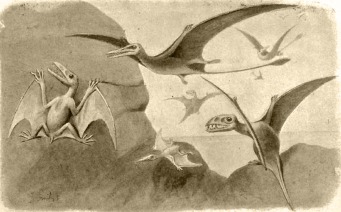 The main stream of the philosophical tradition, whose headwaters were the Greek pre-Socratics, largely occupied itself with accounting for the order observable in the natural world. The purpose in doing so was to uncover a causal connection between the order of nature and the underlying principle or principles constituting the kosmos. The supposition is that the order observable in nature, which is intelligible to rational beings, reflects the ordering principle itself. Thus, rational beings can apprehend, to a limited degree, the purposive nature of the ordering principle, and thereby render an account complementary to, and supporting the philosophical account of the natural world.
The main stream of the philosophical tradition, whose headwaters were the Greek pre-Socratics, largely occupied itself with accounting for the order observable in the natural world. The purpose in doing so was to uncover a causal connection between the order of nature and the underlying principle or principles constituting the kosmos. The supposition is that the order observable in nature, which is intelligible to rational beings, reflects the ordering principle itself. Thus, rational beings can apprehend, to a limited degree, the purposive nature of the ordering principle, and thereby render an account complementary to, and supporting the philosophical account of the natural world.
One stream of thought running counter to the speculative physics and metaphysics of the Greeks was that of the Medieval speculative mystics. The nature of the mystical experience, which is in effect a miracle in both the order of creation and the order of cognition, abrogated the need to philosophically investigate the causes in nature in order to arrive at a mode of certitude concerning the nature of the divine.
According to the mystics, discursive reasoning is not the only means by which the nature of God is known.1 The mystical experience involves a direct internal experience of the divine that passes over the philosophical process of searching out univocal connections, or fixing dualities between the creator and the creation; the rules of deductive reasoning become irrelevant because the mystical union with God tends decidedly toward the irrational and intuitive. Hence, the experiences of the mystics led to the creation of a branch of negative theology running counter to the natural theology of Aristotle and his Medieval followers.
As the Ockhamists had demonstrated by the close of the Middle Ages, the rational mind of man is unable to adequately or accurately fathom the divine nature. Thus, the innovation introduced by the mystics into Medieval Theology was to uncover a direct experience of the divine that circumvented man’s limited natural knowledge of God. The writings of the mystics lay emphasis on the certitude of the knowledge of God through mystical interior experiences and visions, and count their knowledge superior to the work of reason unaided by the divine light. According to the speculative mystics, there is nothing to preclude the experience of God from being an interior experience; thus it became necessary to extend the possibility of what could be included under the category of experience as such.
The mystical encounter with God bypassed the sterility of Scholastic speculation, which was largely a failure at intensifying religious life, and served to show that a philosophical consciousness of one’s internal acts, such as will and reason, is not the sole means of arriving at certitude regarding how God is known or understood.
Under the influence of the neo-Platonists, the speculative mystic’s conception of God necessitated the expansion and spiritualization of the category of experience, which had hitherto been rendered inoperative beyond the philosophical threshold of sensory experience. Because the God of the mystics is rationally unintelligible, the well-trodden avenue of reason is of no avail in circumscribing the spiritual nature of the mystical experience. The God of the mystics is no more philosophically intelligible than the neo-Platonist Plotinus’ hierarchy of abstractions crowned by the One, which is beyond Intellect and Being, and is not a philosophically intelligible object in any sense. However, the difference between the two respective conceptions lies in the realm of possible experience. Any experience of Plotinus’ One is unattainable; on the other hand, experience of the God of the mystics is possible through a spiritual process variously referred to as “degrees of communion with God,” the “divine birth in the soul,” and “degrees of prayer,” among other designations.
As illustrated in the writings of the mystics themselves, the encounter with God is set out in terms reminiscent of Plotinus’ self-refuting endeavor to give an adequate description of the nature of the One, which is indescribable, or Pseudo-Dionysus’ attempt to communicate his incommunicable vision through fantastic images drawn from the world of mutable things. The self is all but extinguished in the mystical union with God, and a soul thus enraptured is unable to convey any positive impression of what occurs, or how. The stream of negative theology that began with the neo-Platonists, and which the speculative mystics were to inherit, culminated in a unique conception of God mirrored in the soul’s ecstatic experience of the divine. Because the mystical experience was an experience of the ineffable, the abstract philosophical attributes of God formulated by the Medieval Aristotelian philosophers fell uselessly away, leaving a quasi-theological, or mystical-theological certitude that functioned independently of the philosophical subtleties of Ancient Greek origin.
1 Neither theosophy nor revelation is mentioned here on account of the fact that the entire crux of Medieval mysticism lies in its apocalyptic and theosophical character.
